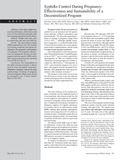| dc.contributor.author | Fonck, K, | |
| dc.contributor.author | Claeys, P | |
| dc.contributor.author | Bashir, F | |
| dc.contributor.author | Bwayo, J, | |
| dc.contributor.author | Fransen, L | |
| dc.contributor.author | Temmerman, M | |
| dc.date.accessioned | 2013-06-26T14:31:42Z | |
| dc.date.available | 2013-06-26T14:31:42Z | |
| dc.date.issued | 2001 | |
| dc.identifier.citation | Am J Public Health. 2001 May;91(5):705-7. | en |
| dc.identifier.uri | http://www.ncbi.nlm.nih.gov/pubmed/11344874 | |
| dc.identifier.uri | http://erepository.uonbi.ac.ke:8080/xmlui/handle/123456789/40646 | |
| dc.identifier.uri | http://www.ncbi.nlm.nih.gov/pmc/articles/PMC1446681/ | |
| dc.description.abstract | OBJECTIVES:
This study sought to assess the performance, effectiveness, and costs of a decentralized antenatal syphilis screening program in Nairobi, Kenya.
METHODS:
Health clinic data, quality control data, and costs were analyzed.
RESULTS:
The rapid plasma reagin (RPR) seroprevalence was 3.4%. In terms of screening, treatment, and partner notification, the program's performance was adequate. The program's effectiveness was problematic because of false-negative and false-positive RPR results. The cost per averted case was calculated to be US$95 to US$112.
CONCLUSIONS:
The sustainability of this labor-intensive program is threatened by costs and logistic constraints. Alternative strategies, such as the mass epidemiologic treatment of pregnant women in high-prevalence areas, should be considered. | en |
| dc.language.iso | en | en |
| dc.publisher | University of Nairobi | en |
| dc.title | Syphilis Control During Pregnancy: Effectiveness And Sustainability Of A Decentralized Program. | en |
| dc.type | Article | en |
| local.publisher | Community Health ,School of Health Sciences | en |


